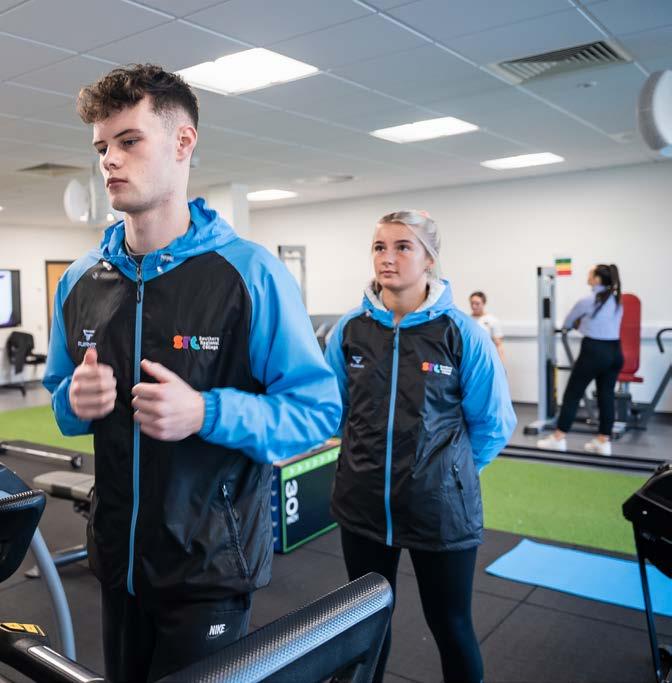
3 minute read
COUNSELLING STUDIES LEVEL 4 CERTIFICATE Banbridge & Newry
Accredited
Overview
This part-time course is awarded and validated by Ulster University. It will introduce students to the interpersonal and counselling theory and skills that are useful for those who wish to work effectively in a helping role with people in a range of professional and personal contexts.
Teaching and learning are achieved by a blend of face-to-face lectures and seminars, group and individual activities, as well as digital and online technology. Students will learn basic psychological and communication theory and develop a range of reflective, interpersonal, communication and counselling skills, to support them in a helping role across settings. Activities to promote self-awareness and impact on others are central and personal development is a key aspect of all three modules of the course.
The course is delivered one day per week over two terms between September and June. Attendance is mandatory and should not be less than 90% of the course.
Successful completion of this course does not confer fitness to practise counselling, but graduates who meet the entrance requirements may progress to the Ulster University Foundation Degree in Integrative Counselling Practice. Entry Requirements
The over-riding consideration in admitting applicants to the course, is evidence that the learner or apprentice is likely to be able to complete the course satisfactorily.
Attendance at Individual or Group Pre-Entry Advice Sessions (IPEAS and GPEAS) may be required. These interviews may take place either on campus, via telephone or video call (Microsoft Teams) and will play an important role in the selection of all courses.
Applicants must be at least 18 years of age on or before 1st July in the year of proposed entry to the course.
• All applications must satisfy Ulster University general entrance requirements for Certificate and Diploma courses. The standard offer for this course is 5 GCSEs (Grade C or above). One of these GCSEs must be English Language Grade C or above or Essential Skills Communication Level 2. In addition, applicants must provide evidence of competence in written and spoken English Language • Applicants who do not meet the criteria outlined above but have evidence of substantial knowledge or relevant industrial experience and skills, which has not been formally assessed, should refer to the College’s Accreditation of Prior Experience and Learning (APEL) Policy at www.src.ac.uk/about-us
The College’s Admissions policy reflects the expectations of the UK Quality Code Admissions, Recruitment and Widening Access (Nov 2018).
Please note that applicants progressing to higher education courses at Level 4 and above in the College or UK Universities may require a specific GCSE/ A Level profile. In some cases, the Essential Skills in Literacy and Numeracy may not be a suitable alternative to a GCSE. The list of acceptable qualifications for equivalency to English and mathematics for Ulster University is available from the following link: www.ulster.ac.uk/apply
It is the responsibility of the applicant to check each University’s progression requirements before enrolling on a course at the College.
Please note that for Ulster University qualifications, the general entry requirements for Ulster University must also be met in addition to those listed below.
A base campus has been listed for the purposes for any face-to-face delivery.
What Will I Study?
Over one year of study for half a day a week, students undertake three core modules, each reflecting 20 credits of study at Level 3:
• The Helping Relationship
• Personal Development and Interpersonal Communication
• Practical Application of the Helping Relationship
How Will I Be Assessed?
Assessment is 100% coursework. Students complete a range of assignments, which draw on the authentic experience of students to increase their personal and professional development, reflective ability, self-awareness and practical communication skills for helping. Assignments may include personal learning records, case study and practical skills evaluations. Students have opportunities for formative feedback throughout the course.
Tuition Fees
Course Fee £368
Exam Fee £TBC
*Where the exam/awarding body fee is listed as TBC, the information has not yet been released by our partner awarding bodies for 23/24. This fee will be published on our website as soon as it becomes available.
Other Fees
Not applicable
Further Study
Graduates from this Certificate course, who are interested in practising counselling as a professional, may progress to the Foundation Degree in Integrative Counselling Practice, which is awarded by Ulster University and accredited by both the British Association of Counselling and Psychotherapy (BACP) and National Counselling Society (NCS). See course details for full entry requirements. For those students without the necessary 48 UCAS points achieved through A-Level, which are required for entrance to the Foundation Degree, the Level 4 Ulster University Certificate in Counselling Studies is accepted as an alternative route for progression to this linked course, since Ulster University recognise the important personal development, competencies and skills achieved on the Certificate programme.
Please note: Progression to the Foundation Degree also requires applicants to hold a qualification in Maths. Successful completion of the Ulster University Certificate in Counselling studies is a desirable criterion for application to the Ulster University Foundation Degree in Integrative Counselling Practice and will be used for selection purposes where courses are over-subscribed.
Contact
FacultyHESC@src.ac.uk 028 3025 9685










